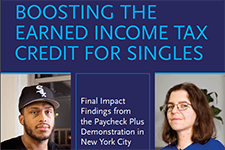In recent years, many states and some local governments implemented or expanded their own,
supplemental Earned Income Tax Credit (EITCs). The expansion of state EITCs may have
stemmed in large part from wanting to provide a more generous program than the federal
program, because state EITCs increase transfer payments to the low-income recipients who
qualify. However, state and local governments can also benefit from maximizing participation
of their constituents in the federal EITC, and there are several reasons why state or local EITCs
could increase participation in the federal EITC program. We find evidence that state EITCs
increase federal EITC program participation. The effects are qualitatively consistent with what
we would expect given theoretical predictions of the effects of an increase in state EITC
generosity on labor supply.
Boosting the Earned Income Tax Credit for Singles



